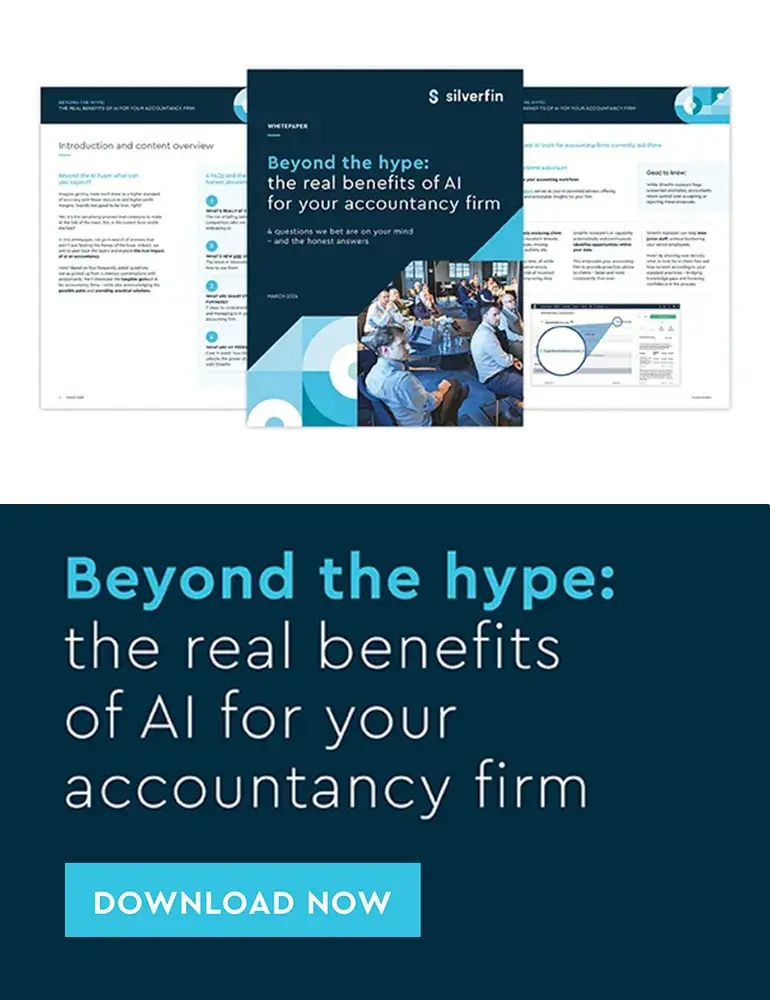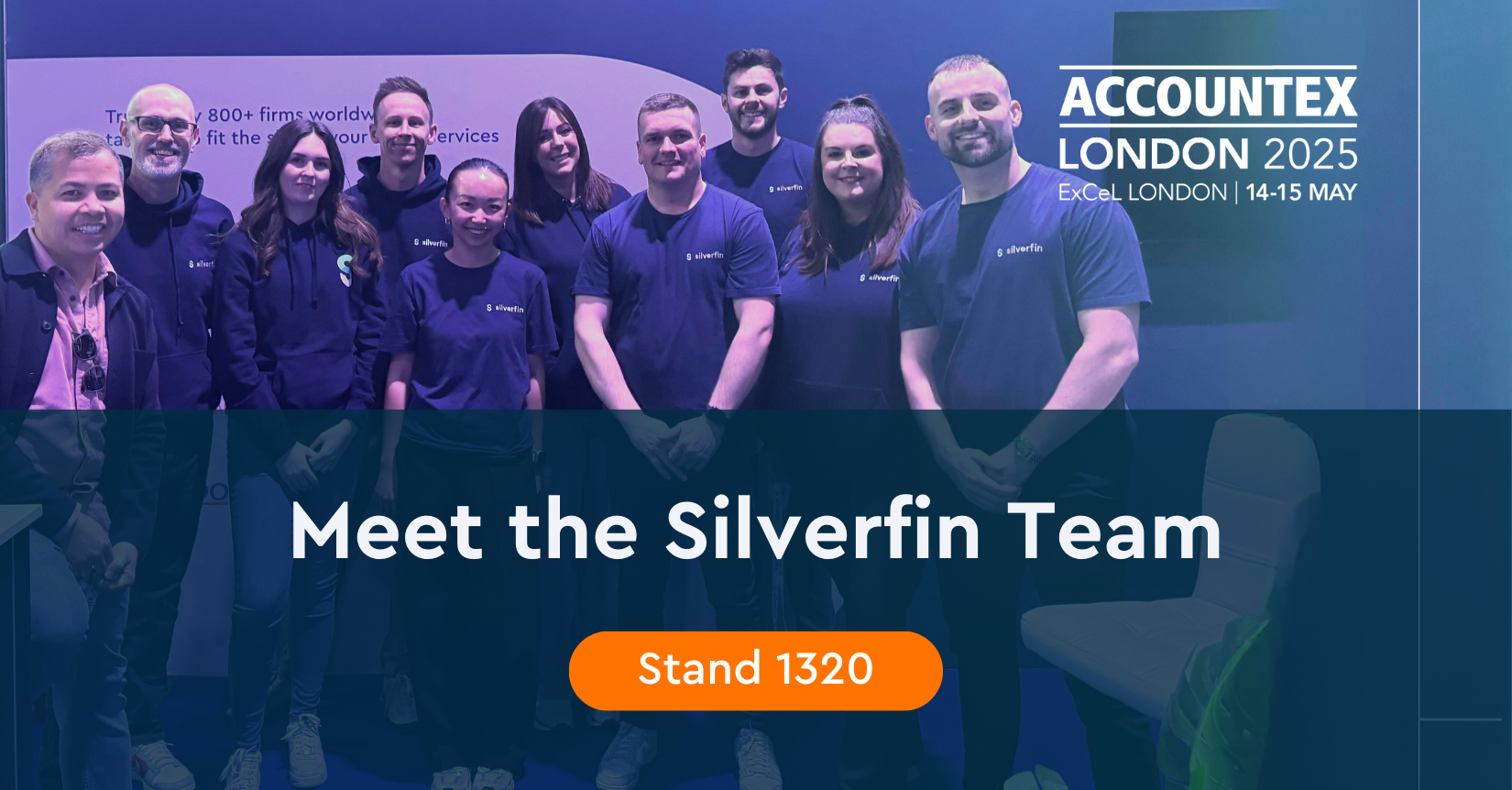This update looks way beyond the last month and even into future years, so buckle in!
On the 15th of June in the heart of Battersea Park, a real show for accountants was organised. With laser lights and silent disco headsets inside, food trucks outside, it was truly an impressive event, but the most memorable were of course the customer interactions with the speakers and exhibitors on the latest technologies and trends in accounting
In a recent keynote with our GM, Cameron Ford, we discussed the transformative impact of AI on accountancy, sharing valuable lessons from Silverfin’s journey, as well as to give our modest view on what the future holds.
We were also excited to announce our upcoming launch of the Silverfin Assistant in the UK.
For those new to the scene, we’ve been working on bringing AI to accountancy since 2017, started development in 2018 and launched in 2019. Back then it was called machine learning, but, as the famous quip goes, the difference between machine learning and AI is that machine learning is written in python and AI is written in powerpoint.
So what have we learned over those years of building, running and selling our AI solutions? Let’s focus on four main things:
1. Start with time savings
For deploying new technology to accountants, or in general any change in people’s way of working, one may expect an initial hesitation, call it healthy scepticism. By initially focusing on the time-saving benefits of AI, users quickly recognise its value, streamlining daily accounting tasks and improving efficiency. It also makes it an easier sale, taking into account that we don’t sell technology like AI or cloud, but specific solutions that make the day to day of accountants easier. Finally, also internally at Silverfin, being able to save time for our users shows success. Success breeds success, so it’s really motivating for our AI team and our company as a whole.
2. Trust is key
Trust is key. AI is probabilistic and often a black box. That means you need to build up trust in the results. If 19 out of 20 analysis are good, and one is way off, you’re not going to trust it. Especially in so-called number professions, experts are used to excel like right-or-wrong calculations with clear inputs, not probabilistic suggestions or indications, even though they are super valuable and insightful. While we recognize this trust needs some time to build up, we did find that typically after 5 to 10 sessions users become familiar with it and trust its outcomes. Accountants are sometimes less conservative than they’re given credit for.
3. The User Experience (UX) is just as important as the AI
Again, with these AI models given probabilistic answers, it becomes crucial how you present and show the outcomes on the screen. It’s important to err on the safe side. Your AI model may have highest accuracy but if the outcomes are confusing or not presented well, the user may not trust it and stop using it. We learned that a poka yoke approach of iteratively taking away possible misunderstandings, brings about the best experience for a broad range of users.
4. Assist, don’t automate
Finally, we strongly believe in assisting accountants with AI rather than automating their work. By pointing out action points or suggesting inputs or opportunities, we make their work process more comfortable and efficient and keep them in charge. Silverfin offers many points of automation, as any platform should, but for these advanced methods, our users prefer to confirm suggestions rather than having to trust that the automation is perfect. It’s often described by our customers as having an extra pair of eyes for more peace of mind. So you are effectively hiring an extra member of staff, who’s never off sick, who’s always available and who is willing to do the boring stuff very quickly. That’s why we call it Silverfin Assistant!
For all of this, the safety aspect can not be overlooked, and we consider this just as crucial as our cloud security, personal data protection, confidentiality etc. I would argue that it is nothing new, but you need to take it just as seriously and bring in the experts.

What might the future of AI in Accountancy hold?
Finally, can we extrapolate these lessons to the future and predict what will happen in the coming years? Well, it’s impossible to say exactly what will happen, but let me share a vision in 3 parts:
- Accountancy firms will depend on their tech providers to incorporate the latest tech, not even the biggest firms will be able to compete on AI. Just as Silverfin will depend on Zoom or Google Meet for video meeting transcription and summarization, on Freshdesk for an AI assisted helpdesk, on Microsoft/OpenAI CoPilot to assist with our ruby on rails or on Salesforce for personalised lead follow up, on Google workspace or Microsoft for workspace efficiency like slides generation, et cetera et cetera. Because why would we have our AI team build any of these, when our focus should be on our customers?
- AI will be embedded in these services, not as an addition, but an integral part of the experience and utility. Customers will expect to buy Spotify and get the recommendation engine included.
- We will see a dichotomy between those tech providers that integrate and embed AI, and those that don’t. In my previous examples, if Zoom don’t offer video transcription and summarisation, people will switch to Google Meet or Microsoft Teams, or the other way around.
These 3 parts lead me to my logical conclusion that not only is it in our best interest at Silverfin to lead the race in AI, it is actually an integral part of our responsibility as a tech provider in accountancy to keep bringing the value of these latest technologies to our customers. We take this responsibility very seriously, but luckily we do find a lot of joy in doing so and engaging with our customers in this way.
Talk to you soon!















